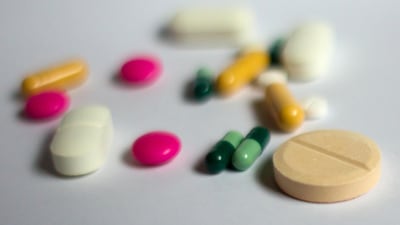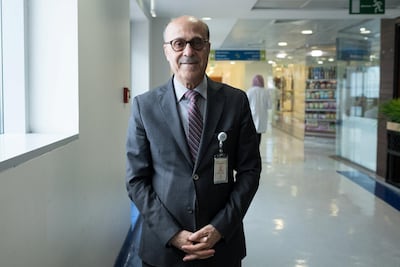A new breakthrough drug for multiple sclerosis will be released in the UAE in a move that doctors hope will change the lives of those with the condition.
Cladribine (Mavenclad) is an oral therapy that will be available in hospitals within weeks.
The pills are taken for a maximum of up to 20 days and patients are then, according to clinical trials, symptom-free for up to four years.
MS is a chronic disease that attacks the central nervous system, affecting the brain, spinal cord, and optic nerves.
Symptoms differ from person to person and range from numbness and tingling to complete paralysis. The exact cause is yet to be determined, but the condition is linked to Vitamin-D deficiency, family history and smoking.
Britain's National Institute for Health and Clinical Excellence (Nice), which advises the country's health service on which drugs to buy, has also recommended Cladribine for patients with "highly active'" MS.
Reliable nationwide figures are not available but it is known there are about 2,000 residents in Abu Dhabi and 2,000 in Dubai living with the condition.
The autoimmune disorder affects 64.44 per 100,000 people in Abu Dhabi, which is more than twice the World Health Organisation's global prevalence estimate of 30 per 100,000.
A report carried out by Johns Hopkins University in conjunction with Tawam Hospital in Al Ain found the "the Abu Dhabi Emirati population has one of the highest, most reliable prevalence rates on the Arab peninsula".
Dr Raed Alroughani, who established the first national MS registry in Kuwait and is head of MS clinic at Ibin Sina Hospital, said that latest numbers from the Gulf states indicates that there is a rise in the prevalence of MS in the region.
“Kuwait and Qatar have registries or at least published data. Kuwait has the highest at around 85 per 100,000 – Dubai around 60 per 100,000 and Abu Dhabi has recently published their numbers which state that are around 60 per 100,000 so we are talking at least double or triple the [average global prevalence] figures.
Dr Jihad Inshasi, consultant neurologist at Rashid Hospital said that one UAE study showed that MS numbers were so high that researchers refused to believe it and rejected it.
“We did a study on prevalence of MS in Dubai and we very surprised that the numbers were so high,” he said.
Treatment for patients in the UAE is typically covered by standard insurance. Some medications cost more than $60,000 per year.
In a study conducted by consultant neurologist at Mafraq Hospital, Dr Ahmed Shatila, found that the average MS patient costs Abu Dhabi healthcare services (SEHA) Dh110,000 per year.
In the past, patients have travelled abroad from the UAE, but medics said there is growing expertise to manage the challenges today.
“The level of education and level of knowledge of neurologists in the UAE is definitely that same as overseas," said Dr Shatila.
"I always tell my patients that we have reached a level where we shouldn’t travel abroad for treatments of MS because we have good clinics in the UAE."
In Kuwait one of the countries with the highest rates of MS in the region, Dr Alroughani said: “We have medications that are even better than some European countries. We have two medications that are not available in Europe.
“There is no deficiency of medication in the UAE but the problem is two-fold; the education of the physician to identify the signs and severity of the case, and determination about what is the best available treatment for their case.”
_____________
Read more:
'Living with MS is all about not giving up'
Multiple sclerosis cases in Abu Dhabi are twice the global average
_____________
Despite advances in medicine, finding the right treatment is trial and error.
The patient is prescribed one drug and after a few months or a year, it there is no improvement, they are given another one.
Dr Alroughani belives that is wrong. “The right approach is to hit the disease with the right drug, not the trial and error approach.”
Dr Shatila also said the ability to pinpoint the right drug for the right type of condition will improve in time and with greater expertise.
“We don’t have a cure but we will reach a point where it is managed very well and there is no trace of disability, but early treatment is very important," he said.
While there are various campaigns organised by the health authorities, education is still lacking amongst the community
“We need to educate society so that they can understand the problem and be more accommodating.” Dr Shatila said
There are various MS clinics but there are no multi disciplinary MS centres which offer a range of therapies such as psychiatry occupational and physiotherapy.
“We need an active central hub,” Dr Shatila said.
"A place to collaborate as a source of knowledge, lobbying, education – to speak for these patients. We have the MS society but we need a strong support hub that is actively involved in society to fight for their needs whether it is handicapped parking, accessibility, making sure there and no job discrimination.”


